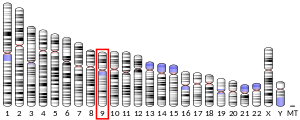Heterogeneous nuclear ribonucleoprotein K (also protein K) is a protein that in humans is encoded by the HNRNPK gene.[5] It is found in the cell nucleus that binds to pre-messenger RNA (mRNA) as a component of heterogeneous ribonucleoprotein particles. The simian homolog is known as protein H16. Both proteins bind to single-stranded DNA as well as to RNA and can stimulate the activity of RNA polymerase II, the protein responsible for most gene transcription. The relative affinities of the proteins for DNA and RNA vary with solution conditions and are inversely correlated, so that conditions promoting strong DNA binding result in weak RNA binding.[6]
RNA binding protein domains in other proteins that are similar to the RNA binding domain of protein K are called K-homology or KH domains.
Protein K has been the subject of study related to colorectal cancer, in which an RNA editing event inducing the expression of an isoform containing a point mutation was found to be specific to cancerous cells.[7]
- ^ a b c GRCh38: Ensembl release 89: ENSG00000165119 – Ensembl, May 2017
- ^ a b c GRCm38: Ensembl release 89: ENSMUSG00000021546 – Ensembl, May 2017
- ^ "Human PubMed Reference:". National Center for Biotechnology Information, U.S. National Library of Medicine.
- ^ "Mouse PubMed Reference:". National Center for Biotechnology Information, U.S. National Library of Medicine.
- ^ Dejgaard K, Leffers H, Rasmussen HH, Madsen P, Kruse TA, Gesser B, et al. (February 1994). "Identification, molecular cloning, expression and chromosome mapping of a family of transformation upregulated hnRNP-K proteins derived by alternative splicing". Journal of Molecular Biology. 236 (1): 33–48. doi:10.1006/jmbi.1994.1116. PMID 8107114.
- ^ Gaillard C, Cabannes E, Strauss F (October 1994). "Identity of the RNA-binding protein K of hnRNP particles with protein H16, a sequence-specific single strand DNA-binding protein". Nucleic Acids Research. 22 (20): 4183–6. doi:10.1093/nar/22.20.4183. PMC 331915. PMID 7524036.
- ^ Klimek-Tomczak K, Mikula M, Dzwonek A, Paziewska A, Karczmarski J, Hennig E, et al. (February 2006). "Editing of hnRNP K protein mRNA in colorectal adenocarcinoma and surrounding mucosa". British Journal of Cancer. 94 (4): 586–92. doi:10.1038/sj.bjc.6602938. PMC 2361188. PMID 16404425.





